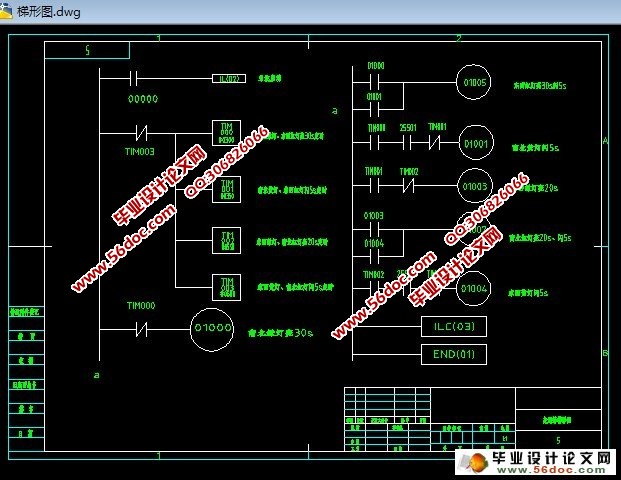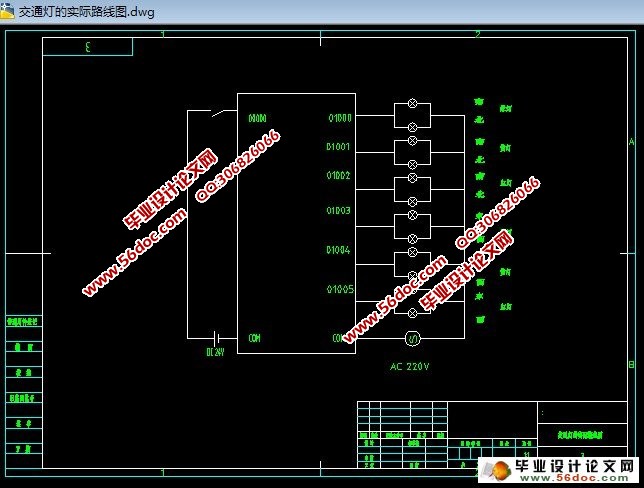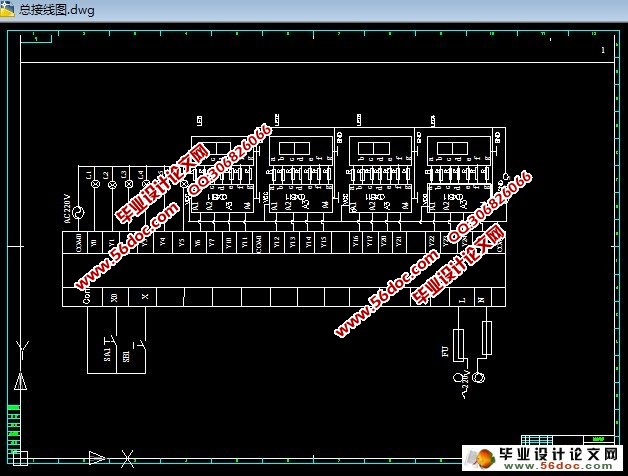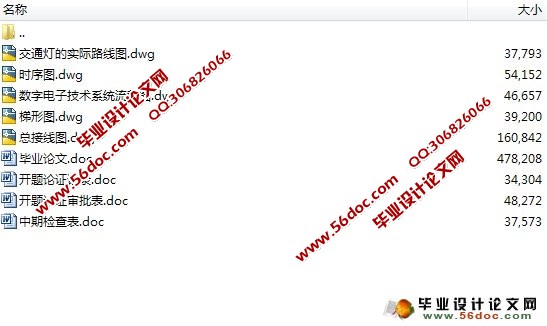基于PLC的交通信号灯电气控制系统的设计
无需注册登录,支付后按照提示操作即可获取该资料.
基于PLC的交通信号灯电气控制系统的设计(开题报告,中期检查表,论文说明书12000字,CAD图纸5张)
摘 要:PLC可编程序控制器是以微处理器为基础,综合了计算机技术、自动控制技术和通讯技术发展而来的一种新型工业控制装置。它具有结构简单、编程方便、可靠性高等优点,已广泛用于工业过程和位置的自动控制中。据统计,可编程控制器是工业自动化装置中应用最多的一种设备。专家认为,可编程控制器将成为今后工业控制的主要手段和重要的基础设备之一,PLC、机器人、CAD/CAM将成为工业生产的三大支柱。本设计应用PLC来控制双向十字路口的交通灯,由于PLC具有对使用环境适应性强的特性,同时其内部定时器资源十分丰富,可对目前普遍使用的渐进式信号灯进行精确控制,特别对多岔路口的控制可方便地实现。在该设计中,还引入F940触摸屏,拟十字路口红绿灯闪亮及车辆通行,十分形象地显示出了PLC在交通灯中的应用。
关键词:交通灯;控制;PLC
Disign of Based on PLC Traffic Light Electric Control System
Abstract:PLC programmable logic controller is a microprocessor based on a combination of computer technology, automatic control and communication technologies developed from a new type of industrial control devices. It has a simple structure, easy programming, high reliability, has been widely used in industrial process and location of the automatic control. According to statistics, the programmable automation controller is the most widely used devices in a device. Experts believe that the future will be a programmable logic controller to control the main means of industry and one of the important infrastructure, PLC, robotics, CAD / CAM will become the three pillars of industrial production. Since the PLC has a strong adaptability to the use of environmental features, while its internal timer is very rich in resources, can be widely used on the current "progressive" signal for precise control, especially for the control of multi-fork can be easily achieved. It is now increasingly used in traffic lights PLC system. In the design, but also the introduction of touch-screen simulation of F940 crossroads and traffic lights flashing, very vividly showed PLC traffic lights in the practical application of the system.
Key words : traffic lights; control; PLC




目 录
摘要•••••••••••••••••••••••••••••••••••••••••••••••••••••••••••••••••••1
关键词•••••••••••••••••••••••••••••••••••••••••••••••••••••••••••••••••1
1 前言•••••••••••••••••••••••••••••••••••••••••••••••••••••••••••••••••2
2 方案论证•••••••••••••••••••••••••••••••••••••••••••••••••••••••••••••5
2.1 基于数电技术交通灯控制系统•••••••••••••••••••••••••••••••••••••••5
2.2 基于单片机技术的智能交通灯控制统•••••••••••••••••••••••••••••••••6
2.3 基于PLC技术的交通灯控制系统•••••••••••••••••••••••••••••••••••••6
3 硬件电路设计及元器件选择•••••••••••••••••••••••••••••••••••••••••••••6
3.1 PLC的技术指标•••••••••••••••••••••••••••••••••••••••••••••••••••6
3.2 可编程控制器的选择•••••••••••••••••••••••••••••••••••••••••••••••8
3.2.1 PLC型号的选择••••••••••••••••••••••••••••••••••••••••••••••••8
3.2.2 输入输出模块的选择••••••••••••••••••••••••••••••••••••••••••9
3. 3 I/O分配表••••••••••••••••••••••••••••••••••••••••••9
3.4 PLC连接图•••••••••••••••••••••••••••••••••••••••••••••••••••••••••11
4 软件设计••••••••••••••••••••••••••••••••••••••••••••••••••••••••••••12
4. 1 常用编程语言简介•••••••••••••••••••••••••••••••••••••••••••••••12
4. 2 梯形图设计方法•••••••••••••••••••••••••••••••••••••••••••••••••15
4. 3 梯形图•••••••••••••••••••••••••••••••••••••••••••••••••••••••••16
4. 4 指令表•••••••••••••••••••••••••••••••••••••••••••••••••••••••••18
结论••••••••••••••••••••••••••••••••••••••••••••••••••••••••••••••••••22
参考文献••••••••••••••••••••••••••••••••••••••••••••••••••••••••••••••23
致谢••••••••••••••••••••••••••••••••••••••••••••••••••••••••••••••••••24
